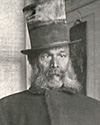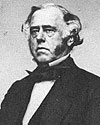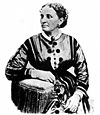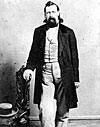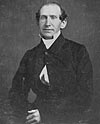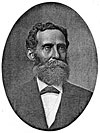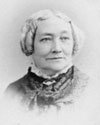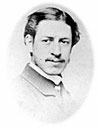Most of the household employees of the White House were white although there were several blacks, including butler-waiter Peter Brown, cook Cornelia Mitchell, and an usher named Edward. The President himself brought a black servant with him from Illinois but racial problems with other employees led Mr. Lincoln to seek other employment for William Johnson. Many of the employees were Irish-Americans like Thomas Burns, the doorkeeper at White House front door whom James Buchanan’s niece said reminded her of President-elect Lincoln’s appearance.1 Mary Todd Lincoln had nurtured long-standing prejudices against the Irish; she had problems with Irish-American maids in Springfield. She preferred the company of her seamstress, Elizabeth Keckley, a former slave. The wife of William Slade, black steward and messenger, was given the dress that Mrs. Lincoln had worn when her husband was assassinated.
Mr. Lincoln had no such prejudice against the Irish. Laurance Mangan’s brother was a White House coachman. Laurance recalled a week in which he substituted for his sick brother:
President Lincoln was a grand man. Quiet and gentle in every respect, he was always thoughtful of those who served him, and although I was but a youngster in those days and not very long over Ireland, Mr. Lincoln treated me with the same consideration he always bestowed on his regular men.
President Lincoln was spending the summer at what is now the Soldiers’ Home grounds, occupying the house of the governor of the Home as was then the custom, and it was there I reported to him. I drove him down to the offices that first morning and that evening when we returned the President asked me to have the horses around again after supper, as he wanted to go out and look at the stars through that big new telescope they had installed at the naval observatory. I drove him out there that night and was also permitted to look through the telescope.
The trip to the observatory was about the only long one on which I drove the President. It sounds funny, I know, to talk about that as a long trip this day and time but it was a fairly long distance in those days.
Mr. Lincoln was very regular about his habits. He called for his carriage every morning about the same hour, and while I was with him at least, he left for his home every night about the same time. He was greatly interested in his children and they used to come to meet him and ride up to the house with him.”2
Lincoln Scholar Harold Holzer wrote: “The White House itself offered employment opportunities for stewards, a gardener (each at $800 per annum), doorkeeper, assistant doorkeeper fireman (furnace operate), and two watchmen (all at $600), the lot of them under the supervision of yet another presidential appointment, the commisioner of public buildings ($2,000 annually), who was responsible as well for administering a staff of twenty-two additional laborers, eight lamplighters, several Washington bridge ‘drawkeepers,’ a public gardener, and others.”3
Mrs. Lincoln was more demanding and less popular. “From the very beginning Mrs. Lincoln assumed and held her rightful position as head of the mansion; nor was it always easy to designate the precise limit of her authority,” wrote William O. Stoddard.4 Although Mrs. Lincoln was in nominal charge, there were limits to her authority. She needed to work with the commissioner of public buildings and her husband’s secretaries to pay the White House bills. They were not always in agreement with her unorthodox ways of dealing with personnel and budget problems. She had a tendency to manipulate and be manipulated by employees. Several employees like steward Richard Goodchild were dismissed by Mrs. Lincoln.
Another White House employee, guard William Crook, remembered: “Mrs. Lincoln had to give some time to household affairs. Everything was comparatively simple at that time; there were fewer servants than have been considered necessary since. The first duty of Mrs. Lincoln’s day was a consultation with the steward, whose name was Stackpole. The cook was an old-time negro woman. A good deal of domestic supervision was necessary with the mistress of the house.” Crook wrote: “The President’s wife found time, too, to investigate cases of need that were brought to her attention, and to help. I know of such cases. She was kind to all the employees of the White House. I think she was very generally liked.”5
Other employees were hired for altruistic reasons. Alice Johnstone was a cook and domestic whom the Lincolns employed because she desperately needed a job. She was also employed in Mrs. Lincoln’s schemes to get the President to eat. “Alice, do you know how to make a dish of fricasseed chicken and small biscuits with thick cream gravy poured over it, all on one platter?” asked Mrs. Lincoln. Alice’s meal was served in the family dining room. It appealed sufficiently to the presidential appetite that Tad exclaimed: “Oh, Alice, he ate three helps and more gravy than you and me and mother could.”6
The President had a different approach to personnel relations—especially with his immediate presidential assistants. John Nicolay and John Hay were the mainstays of his office but they were supplemented by William Stoddard, Edward D. Neill, Nathaniel S. Howe, Gustav Matile and Charles Philbrick. According to Stoddard, Mr. Lincoln assumed his assistants “knew their duties and were expected to do them without throwing any burden of supervision on him. Nevertheless, he was an unconscious driver and was unintentionally, though unrelentingly, exactly.”7 Stoddard wrote: “Towards his immediate subordinates, private secretaries, messengers, and other officials or servants, it may almost be said that he had no manner at all, he took their presence and the performance of their duties so utterly for granted. No one of them was ever made to feel, unpleasantly, the fact of his inferior position by reason of any look or word of the President. All were well assured that they could not get a word from him unless the business which brought them to his elbow justified them in coming. The number of times that Mrs. Lincoln herself entered his business-room at the White House could probably be counted on the fingers of one hand.”8
Coachmen tended to be a particular problem for the Lincolns since their inebriated state sometimes caused problems for the family. Coachman Patterson McGee was dismissed on February 10, 1864, shortly before the White House stables burned. He was subsequently arrested for arson after he was sighted scene at the crime. He was released for lack of evidence. Journalist Noah Brooks related how Mr. Lincoln dealt with even obstreperous servants: “One morning the president happened to meet his Irish coachman at the door, and asked him to go out and get the morning paper. The Jehu departed, but, like the unfilial party of whom we read in Scripture, he said, ‘I go,’ but went not, and the anxious President went out himself and invested five cents in a Morning Chronicle. It afterwards transpired that the coachman did not consider it his business to run errands, which coming to the President’s ears he ordered up the carriage the next morning at six o-clock and sent a member of his household in the equipage to the Avenue, where he bought a paper and rode back, with the mortified coachee on the box.”9
If they left White House service, employees frequently received presidential recommendations of employment. Louis Burgdorf was a messenger and guard outside President Lincoln’ office, for whom Mr. Lincoln arranged an appointment with Secretary of the Treasury Salmon Chase in April 1993. His job including delivering the President’s mail. Noah Brooks said he was “German, crusty, pragmatical, and pertinacious; proud of his position and authority, and little tolerant of interference; but trustworthy, and, on the whole, capable…”10 Mr. Calvert was an unidentified White House employee, for whom President Lincoln wrote a reference in November 8, 1862. “I can very cheerfully say that Mr. Calvert has for some time been employed at the White-house, and has appeared to be a very faithful, worthy and gentlemanly young man.”11 Mrs. Lincoln also wrote letters of recommendation—such as one for butler Pierre Vermeren—and she kept up her husband’s habit after his death. In December 1866, she wrote Orville Browning on behalf of Thomas Cross—”an honest industrious man [who] was always highly esteemed by my beloved husband.”12
Edward “Ned” Burke was a White House steward and coachman. President Lincoln wrote a letter of recommendation for him on March 4, 1862: “Edward Burke, the bearer of this, was at service in this Mansion for several months now last past; and during all the time he appeared to me to be a competent, faithful and very genteel man. I take no charge of the servants about the house; but I do not understand that Burke leaves because of any fault or misconduct.”13 Burke later reappeared on the White House payroll in 1865 and drove the Lincolns to Ford’s Theater on April 14, 1865.
Some employees did not leave on such good terms. Cornelius O’Leary was a doorkeeper to the President’s office who replaced Edward McManus. He was allegedly involved in peddling influence. He was dismissed in 1865 for taking a bribe to attempt to influence amnesty case. Journalist Noah Brooks recorded what happened: “Everybody knows that it is the constant practice of the President to discharge prisoners of war who take the amnesty oath upon proper application being made by the Congressmen who represent the districts where their homes are located. This application was made by a Union Congressman from Kentucky, and, it now appears, was laid before the President by H.W. Harrington, of Indiana, into whose hands O’Leary gave the paper. The same result would have been attained if the application had been sent to the President through the hands of his Private Secretary, but Etheridge, with his innate love of intrigue, appeared to prefer bribing a servant to accomplish what any man could do in the regular way, and then, having extorted forcibly his bribe from the tempted servant, he rushed his own disgrace and shame into print, as if he had done a very fine thing. O’Leary was, of course, instantly dismissed from service when the President ascertained what had been done; but whatever may be the public verdict in his case no sane man can regard with any degree of tolerance the part which Emerson Etheridge has played in the matter.”14
Similarity of names has made it difficult to tell some of the coachmen, doorkeepers and stewards apart. In addition to “Edward” Burke, “Edward McManus” and “Edward Moran” were doorkeepers of Irish-American descent who may have been confused by history. “Old Edward” was the chief doorkeeper who was the first person to greet the Lincolns after the Inauguration on March 4, 1861. He controlled the door for White House levees and sometimes cracked nuts for them as well. William O. Stoddard recalled that “Old Edward” had “his own ideas of presidential dignity” and “did not approve of the fact that Mr. Lincoln had roped his own trunks and boxes in Springfield, and marked them, ‘A. Lincoln, Washington, D.C.,’ the night before starting on his trip to the capital. ‘The President, no less!'” Old Edward was equally appalled when Mr. Lincoln went out to Pennsylvania Avenue: “Sure he was only waving his arm and shouting at a newsboy to bring him the morning paper. The President of the United States, no less!”15
Later, Mrs. Lincoln decided Edward McManus was a “serpent.” In early 1865, he was dismissed by Mrs. Lincoln for alleged tardiness in delivering some documents or perhaps for divulging some secret she had guarded. Such disagreements could cause friction between the President and his wife. After she fired McManus, according to historian Stephen B. Oates, “she and Lincoln had an ugly scene. In her misery, Mary told one of her male friends about the quarrel, but later wrote the man to keep it a ‘sacredly guarded’ secret that she’d talked with him about her marital troubles. Because she knew how Lincoln grieved ‘over any coolness of mine,’ she went to him, and they made up and had ‘quite a little laugh together.'”16
Contrary to Noah Brooks’ contention that “no colored persons are employed about the Executive Mansion,” John E. Washington chronicled several in They Knew Lincoln: “The colored people who worked in the White House were considered the cream of Washington’s colored society and were the recognized leaders in church, fraternal and social organizations. Nearly all were members of the 15th Street Presbyterian Church, one of the leading colored churches of the day. These servants were so clannish that they even boycotted new employees; for they were jealous and fearful of their jobs when a new President took office.”17
It is clear, that the White House staff were a source of conflict for the Lincolns. The President’s first appointee as commissioner of public buildings, William Woods, first sought and then fell out of Mrs. Lincoln’s favor. He was dismissed but gardener James Watt proved more difficult to dislodge, despite charges of Confederate sympathies. A congressional committee headed by Congressman John F. Potter investigated. According to historian Margaret Leech: “…the favors shown to Watt were astounding to Potter, who had hastened to communicate the evidence against the gardener to the President. Soon after, Watt was given a lieutenant’s commission in the regular Army. The historian, George Bancroft, heard that ‘Madame wished a rogue who had cheated the government made a lieutenant,’ and that the President forced the reluctant Cabinet to approve, telling them, ‘Mrs. Lincoln has for three nights slept in a separate apartment.’ The story is representative of the gossip of Washington, not of Lincoln’s habit of speech.”18
The White House was operated on a rather informal basis. On October 1, 1861, Navy Secretary Gideon Welles recorded in his diary: “Called this morning at the White House, but learned the President had left the city. The porter said he made no mention whither he was going, nor when he would return.”19 Sometimes the financial business of the White lapsed from informality into sloppiness or worse. According to Assistant Secretary of the Treasury Maunsell Field, “there was very clever financiering done in the White House in those days, about which the President was supposed to have little or no knowledge. He only knew that the establishment was conducted in a marvelously economical manner. I had it from a Senator, who was appointed chairman of an investigating committee upon the subject at a secret session of the Senate, that a state dinner was paid for out of an appropriation for fertilizers for the grounds connected with the executive Mansion.”20
“Inside the White House, Edward Moran was on duty at the front door, as he had been since he was appointed to the post, years before, by President Zachary Taylor. Moran was a host in himself—a short, thin, humorous Irishman, to be trusted equally with state secrets, or with the diplomatic management of the President’s unpredictable young son Tad,” was how the daughter of presidential secretary John G. Nicolay described the doorkeeper.20 Presidential aide William O. Stoddard described Moran as the first man met in the White House by Mr. Lincoln who succeeded in making him laugh:
“Mr. Secretary’—and he is holding out something upon the palm of his open hand—’I’ve been getting some new latch-keys for the young gentlemen. I don’t know what’s become of the keys we had. Maybe they’ve gone South and mean to come back, some day, and open the door.”
Two of the keys are bright and new, but one is old and tarnished.
‘There’s one for Mr. Nicolay, and one for Mr. Hay and one for yourself. That’s the old one, that belonged to the lock when it was put on.’
‘That’s the key I want, Edward. Give Nicolay and Hay the new ones.’
‘It’s like meself—it can open the door as well as ever it could,’ laughs old Edward.
We have the key, therefore, and we can go into and out of the house as we please.22
The President enjoyed his Irish humor and once told a story about Old Edward to William O. Stoddard: “There a great deal of fun in him. Just after [President] Taylor’s death, when Fillmore succeeded him, Fillmore needed to buy a carriage. Some gentleman here was breaking up housekeeping and had one for sale, and Fillmore took Edward with him when he went to look at it. It seemed to be a pretty good turnout, but Fillmore, looked it carefully over and then asked Edward: ‘How do you think it will do for the President of the United States to ride in a second-hand carriage?'” Replied Old Edward: “Sure, you Excellency, you’re only a second-hand President, you know.”23
In addition to their regular responsibilities, many White House employees had additional duties involving Willie and Tad Lincoln. Tom Cross, White House messenger, furnace keeper, and doorkeeper also watched Tad and Willie. Alphonso Dunn was a doorkeeper, but he went to Grover’s Theater with Tad on April 14, 1865 to watch “Aladdin!” and returned with him to the White House after learning of the President’s assassination. Guard William Crook told the following story about James Haliday, a carpenter who helped Tad construct a stage for his amateur theater performances. According to Crook, Haliday was one of the White House employees drafted into Tad’s military service:
Like all other boys of those exciting times, Tad had the military fever. But he was allowed to gratify it in a way not open to other boys. The Secretary of War gave him a lieutenant’s commission and an order on the arsenal for twenty-five guns; a pretty uniform was made for him. The guns were kept in the basement in a room opening off of the furnace room, and the Lieutenant had his headquarters in a little place opposite the laundry. He not only drilled his company outside and marched them through the house, but he kept them on guard duty at night to relieve the ‘bucktails,’ as the military guard of the White House was familiarly called. The first night of this military despotism Haliday, who had been appointed a sergeant, appeared before his superior. He saluted and said:
‘Mr. Lieutenant. I would like to have a pass this evening.’ The lieutenant acknowledged the salute and replied:
‘All right; I will give the sergeant a pass.’ He scribbled something on a piece of paper and handed it to him. The other members of the company were kept up until ten o’clock that night on guard duty. The next day Haliday, knowing what he had escaped, again sought Lieutenant Tad in his basement headquarters. Taking off his hat, he asked for a pass. But the lieutenant ‘got mad.’
‘What kind of a soldier are you? You want a pass every evening!’ he said.
‘All right, Mr. Lieutenant.’ Haliday was meek enough now. ‘I will be on duty to-night.’
In about an hour Tad sent his sergeant to the National Theatre and left word with another underling that when Haliday returned he was to be given his pass, after all. That night the rest of the company was kept on duty until one o’clock. But that was somewhat too strenuous. Either there was mutiny or the commander-in-chief interfered, for that was the last night they were on duty outside.
Tad’s taste of command in military matters was so pleasing that he began to enlarge his field of operations. Haliday, aided by the gardener, was about to take up the carpet in the congressional, or state, dining-room. The long table made it somewhat difficult, and they were debating about which end to attack it from, when Tad appeared. He surveyed the field.
‘Jim,’ he said to Haliday. ‘I have a favor to ask of you. Jim, grant it,’ he coaxed.
Jim, of course, said ‘Yes,’ as every one had a way of doing—and yet it wasn’t because it was the President’s son.
‘Now, Jim,’ he said, taking an attitude of command, ‘you work with the other man. I will boss the job.’ And Haliday, talking about it, asserts to this day: ‘He told us just how to go about it. And there was no one could engineer it better than he did.’ Haliday tells, too, that Tad often borrowed money of him when some poor man asked him for help and the boy had nothing in his pockets. ‘And he always paid me back. He never forgot it.’24
Alexander Williamson had full-time duties with the Lincoln sons. He was tutor to Willie Lincoln and later served as a clerk in the Treasury Department after President Lincoln recommended him to Secretary Chase in March 1863. Mrs. Lincoln enlisted him in her efforts to secure government help for Williamson’s financial problems. Williamson was impressed with Willie’s abilities and said he “had only to con over once or twice a page of his speller and definer, and the impression became so fixed that he went though without hesitation or blundering, and his other studies in proportion.”25 After Mrs. Lincoln was widowed, she used Williamson to help lobby in Washington for a government pension.
Footnotes
- William Seale, The President’s House: A History, p. 363.
- Allen C. Clark, “Abraham Lincoln in the National Capital,” Journal of the Columbia Historical Society, Volume XXVII, p. 37-38 (Washington Post, August 3, 1924)
- Harold Holzer, Lincoln President-Elect: Abraham Lincoln and the Great Secession Winter 1860-1861, p. 234.
- William O. Stoddard, Abraham Lincoln: The Man and the War President, p. 244.
- Margarita Spalding Gerry, editor, Through Five Administrations: Reminiscences of Colonel William H. Crook, p. 17-18.
- Ruth Painter Randall, Mary Lincoln: Portrait of a Marriage, p. 303-304.
- William O. Stoddard, Jr., editor, Lincoln’s Third Secretary, p. 99.
- William O. Stoddard, Abraham Lincoln, p. 403.
- Michael Burlingame, editor, Lincoln Observed: Civil War Dispatches of Noah Brooks, p. 49.
- Michael Burlingame, editor, William O. Stoddard, Inside the White House in War Times, p. 151.
- Roy P. Basler, editor, Collected Works of Abraham Lincoln, Volume V, p. 491.
- Justin G. Turner & Linda Levitt Turner, editors, Mary Todd Lincoln: Her Life and Letters, p. 397.
- Roy P. Basler, editor, Collected Works of Abraham Lincoln, Volume V, 143.
- Michael Burlingame, editor, Lincoln Observed: Civil War Dispatches of Noah Brooks, p. 174.
- William O. Stoddard, Jr., Lincoln’s Third Secretary, p. 74.
- Stephen B. Oates, With Malice Toward None: A Life of Abraham Lincoln, p. 409.
- Noah Brooks, Mr. Lincoln’s Washington, p. 178 (May 2, 1863). John E. Washington, They Knew Lincoln, p. 107
- Margaret Leech, Reveille in Washington, p. 300.
- Gideon Welles, Diary of Gideon Welles, Volume I, p. 157.
- Maunsell Field, Memories of Many Men, p. 283-284.
- Helen Nicolay, Lincoln’s Secretary, p. 121.
- Michael Burlingame, editor, Inside the White House in War Times: Memoirs and Reports of Lincoln’s Secretary, p. 3-4.
- Stoddard, Inside the White House in War Timespp. 46-47.
- Margarita Spalding Gerry, editor, Through Five Administrations: Reminiscences of Colonel William H. Crook, p. 21-23.
- Wayne C. Temple, Abraham Lincoln: From Skeptic to Prophet, p. 182.
Visit



